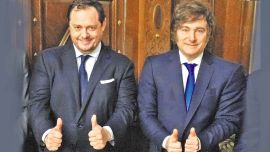In his epic 1867 novel (the size of which has scared off many a schoolchild) War and Peace, Leo Tolstoy remarked that the most powerful of all warriors are patience and time. Both will be needed in great doses if Argentine society is finally ready to shake off the sickness of corruption. There can be no doubt that one of this year’s major stories has been the so-called ‘notebooks’ corruption scandal, uncovered by La Nación reporter Diego Cabot. There’s stiff competition, of course, including a severely damaging economic and financial crisis, the showdown over legalised abortion, and the social condemnation of accused rapist Juan Darthés that spurred the #MiraComoNosPonemos uprising against gender violence and abuse.
Yet, the most important corruption case to reach the courts since the return of democracy in 1983 has been a definite game-changer, leading to the imprisonment of several highranking officials of the Kirchnerite era including Julio De Vido, the testimony and indictment of several of the country’s most powerful businessmen including Ángelo Calcaterra (who is President Macri’s cousin), and of course the confirmation by an appeal’s court this week that former president Cristina Fernández de Kirchner should stand trial as the head of a criminal network.
The direction of the case, which has landed on federal judge Claudio Bonadio’s lap, is ridden with contradictions, but it retains the capacity to truly set precedents and could begin the real eradication of corruption in a country that is seen damingly by the Transparency International NGO as highly corrupt.
To return to Tolstoy, both patience and time are needed if this process is to successfully confirm the involvement of guilty parties and punish them proportionally, particularly as this has never happened before. This also means that politically timed announcements and the appearance of cases that have been rigged could be fatal, as it would further erode trust in one of the country’s institutions that least has it. People aren’t stupid, they remember the judges that danced to the Kirchner’s tune not too long ago, not to mention Carlos Menem’s in the 1990s. This means the Judiciary must not only impart the law fairly, but appear pristine to be in its decision-making.
The controversial use of preventive prison terms, as part of a strategy that pushes lower members of a criminal racket to confess crimes and point the finger up the ladder, works better to pursue the mob than endemic structures of public-private corruption, including eternal business families and seemingly all-powerful government officials that have fallen from grace. By the same token, lowering the severity of the accusations against business owners and chief executives that paid bribes in exchange for lucrative public works projects that rewarded them handsomely smells fishy. If time is always of the essence, the court’s ruling seems perfectly timed, guaranteeing that the private sector enjoys Christmas knowing none of its top executives will spend time behind bars. It’s a victory for Techint CEO Paolo Rocca, who has pushed the idea that the private sector was extorted by the Kirchners.
Paradoxically, the court’s
confirmation of a pre-trial prison
sentence against Fernández
de Kirchner plays to her favour,
and the government’s. As has
been clear, the Senate will not
strip her of immunity until she
has been tried and convicted,
which could take years. The expresident
can continue to play
the victim, blaming the current
president and mainstream media
as being behind a political
persecution. For Macri, whose
public image has been battered
by a painful economic crisis, it
is evidence before the electorate
that his main rival in next year’s
elections is a crook.related news





















Comments